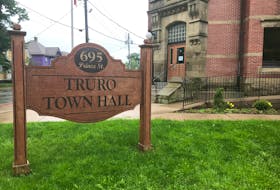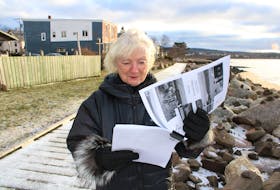
“Are you from Away?” she has been known to ask people on the street or in the grocery store. As an immigrant, first to Toronto and then to New Glasgow, and a particularly active member of the Multicultural Association of Pictou County, Shirke is always on the lookout for newcomers.
“Life is easier and happier when we join together and some people need an invitation,” she explained.
That’s a message, not only for newcomers, but to all Pictou County residents.
“When we come here we don’t want our only friends to be other newcomers. We also want to make friends with people who have always lived here. We have to remove the idea the multicultural association is for newcomers because it is for everyone.”
Born and raised in a small city in India, Shirke spent five years in the capital city of New Delhi and 10 years in Oman, in the Middle East, before moving to Toronto.
“My husband always had the dream of going to a North American school but could never afford it. It became possible for our son.”
Shirke and her son settled in Toronto in 2007 while her husband, Ajay, continued to work in Oman for a year. She worked hard to get her certification to teach English as an additional language and began working with adults.
“After Ajay came he was offered a job with Sobeys in Stellarton. Moving to Nova Scotia was not part of our plan. We did not even have much idea where it was.”
Ajay went for an interview and was excited about the job and the area.
“He told me it was very beautiful and we would be able to afford to buy a home, something we could never do in Toronto. Sobeys paid for me to come see the area and we quickly decided our future was in Nova Scotia.”
Before Shirke arrived her husband had been to the library and picked up a pamphlet on the newly formed Multicultural Association of Pictou County.
“I thought it said something wonderful that there was an association. I knew it was where I’d make my first friends.”
They arrived in New Glasgow on Canada Day, 2009, and became happy homeowners.
“In Toronto there are communities from all over the world so you tend toward your community but in Pictou County, with the much smaller population, immigrants have to get to know other immigrants from different backgrounds. In small towns and rural Nova Scotia there is a better opportunity to get to know everyone, to truly bridge cultures.”
The Shirkes, who have both served in executive roles on the multicultural association, were looking for a home as well as a house.
‘We made the decision to belong here, to put down roots, and I think that is so important. You have to be welcomed, as we were, but you have to want to belong, too.”
Shirke believes her son, now studying at Dalhousie University, had the greatest adjustment.
“Indian parents think they know best and we should have included him more in the decision. The high school years are a hard time to move and I think now it could have been easier for him so I’m very grateful it all turned out well.”
The imminent arrival of refugees from Syria has Shirke thinking in personal and professional terms as she is the sole English Additional Language teacher in Chignecto Central Regional School Board. She is counting on her training, experience and instincts to guide her.
“I know Toronto solutions don’t necessarily work here but a welcome and a smile always work. We’ll begin with geography, with maps and globes showing the students where they came from and where they are. We’ll build our bridges.”
She knows a few Arabic phrases and is constantly learning about the culture.
“I have to remember these people did not come to Canada by choice as I did. They have no country to return to so they desperately need our kindness.”
Part of her role will be helping Syrian parents adjust to a new school system and interaction with teachers.
“I had a lot to learn in that area because it was very different in India. When I first began working in the local schools I was shocked to see principals out of the office, working with teachers and talking to students.”
Through the multicultural association and at a summer language camp in Truro where she also teaches, she has found food to be a great way of generating cultural appreciation.
“There is always great interest in our cooking classes and potlucks and I always introduce my students to strawberry shortcake because it is so beautiful and delicious.”
She expects the help extended Syrian refugees will be repaid in short order.
“These are good hard-working people and Nova Scotia desperately needs people. Let’s give them the time they need to settle in and tomorrow they may be able to help us.”








